Scholarships turn dreams into realities for many talented students who otherwise couldn’t afford to attend a school like Washington University. Knowing the impact that scholarships can have, university leaders set the goal of raising $150 million for new scholarships during Leading Together: The Campaign for Washington University. Inspired donors had soon given double that. In the end, the university raised an unprecedented $591 million, including funds to create 690 new endowed scholarships and fellowships.
Two key challenges helped inspire scholarship giving: the McDonnell Scholarship Challenge, made possible by support from Life Trustee John F. McDonnell, DSc ’06, MBA ’14; and the Taylor Family Scholarship Challenge, which was spearheaded by Andrew Taylor, life trustee and chair of the campaign’s public phase, and his wife, Barbara.
The McDonnell Scholarship Challenge matched scholarship gifts up to $20 million, while the Taylor family led a $10 million challenge in 2017 and 2018. Both families have a longtime commitment to preparing the leaders of tomorrow.
In 2005, McDonnell, former chairman of the board for McDonnell Douglas Corp., and the JSM Charitable Trust established the McDonnell International Scholars Academy, a global research and education partnership. Today, the university and 34 leading global institutions attract the best and brightest from around the world to Washington University for graduate study.
The Taylor family and Enterprise Holdings, with a gift of $25 million, established the Enterprise Holdings Scholars program in 2001. Ten years later, during Leading Together, Jack C. Taylor — Andrew Taylor’s father, founder of Enterprise Holdings and a university emeritus trustee — gave an additional $25 million for scholarships on behalf of the company. And in 2015, Andrew and Barbara Taylor committed $10 million for this purpose. Overall, the Taylor family and Enterprise Holdings have given $70 million toward the Enterprise Holdings Scholars program, benefiting more than 300 students already.
“Scholarships are critical to advancing the university’s mission,” says Andrew Taylor, executive chairman of Enterprise Holdings. “They allow us to serve students from many different socioeconomic backgrounds. These are outstanding students who make valuable contributions to academics, research and university life, and who will ultimately go on to serve society.”
Here, alumni Li Chen and LiaFaith Reed, along with current students Gabriela Hall, Ella Holman and Patrick Murray, share stories of how their lives and careers were positively impacted by scholarship giving.
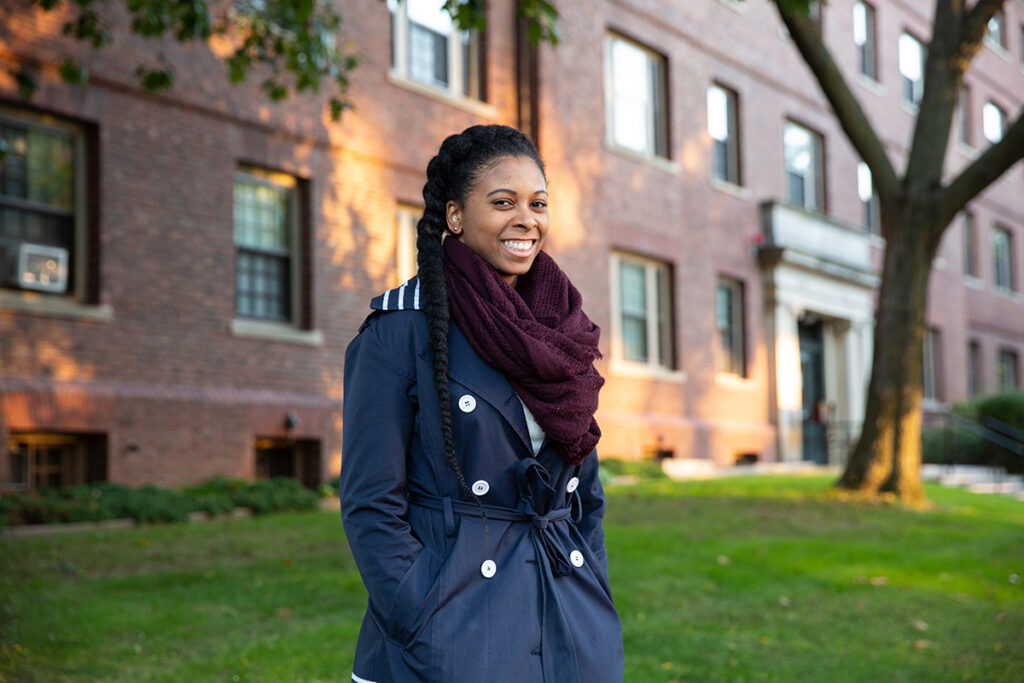
Photo by Casey Atkins
At 15, LiaFaith Reed was living on her own, supporting herself with a full-time job, battling homelessness and still managing to remain at the top of her high school class. So when Reed was considering colleges, she needed one that was going to support her.
“It was difficult to get independent status at other schools,” Reed says. “WashU and the financial aid office really worked with me to make that an easy process.”
Reed also was awarded Enterprise Holdings and Larry Thomas scholarships. “Without that help, I would not have been able to be in college. Period,” Reed says.
Despite sometimes feeling out of place compared with her peers, Reed thrived in college. Outside the classroom, she served as executive producer on a mock news and variety show on WUTV, participated in the international business fraternity Delta Sigma Pi, was a resident adviser for two years, and volunteered at Barbara Jordan Elementary School through the Big Brothers/Big Sisters program. In her junior and senior years, Reed also worked as a teaching assistant at Imagine School, an experience that inspired her to join Teach For America (TFA) after college.
As part of TFA, Reed taught middle school in Washington, D.C., while earning a master’s degree in education policy and leadership at American University. She eventually became the strategic school operations director for District of Columbia Public Schools.
By 2017, Reed started considering next steps. “I knew that I wanted to do policy work,” she says, “to have an impact on the systems and structures that influence education.” She understood that law was one of the tools that affects policy and, therefore, decided to apply to law school.
In fall 2017, Reed matriculated at Harvard Law School. There, she works in the Harvard Legal Aid Bureau and for the Harvard Defenders as a student attorney. She is also a teaching assistant and a board member and symposium committee chairperson for the Journal on Racial and Ethnic Justice. She is on course to earn her JD in 2020.
After law school, Reed plans to work as an attorney in New York and clerk for a judge before returning to the public sector. “My end goal is to practice law that affects policy or direct services for poor people of color,” Reed says.
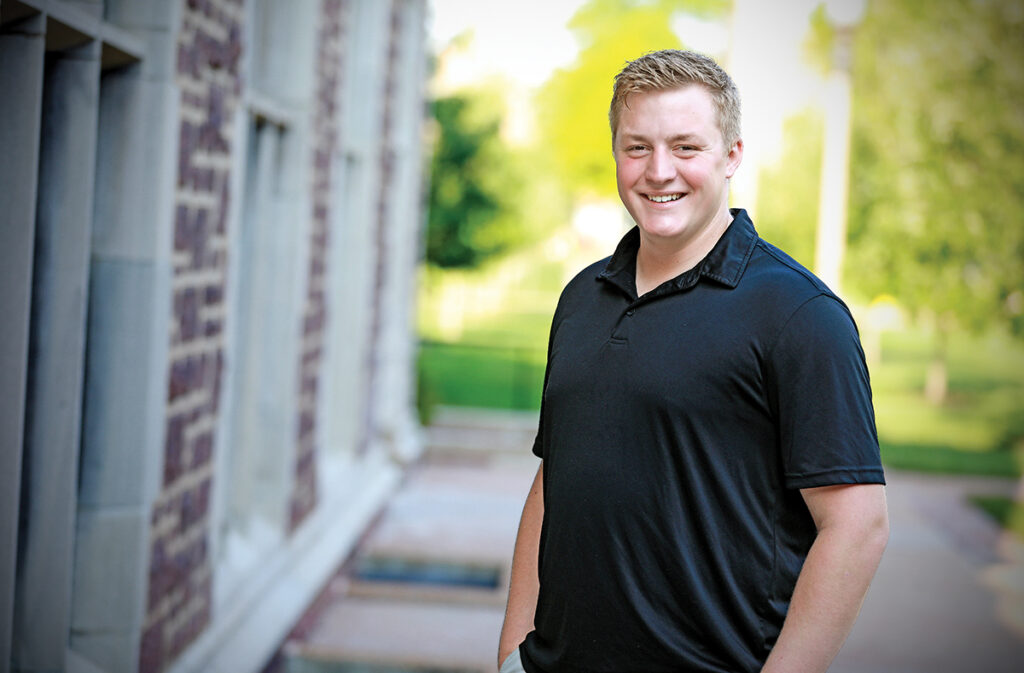
Photo by James Byard
Growing up in a small town outside Jefferson City, Missouri, Patrick Murray knew he wanted to be an architect and play football, and he wanted to do both at Washington University. “But at my high school, we didn’t send people to institutions like WashU,” Murray says.
He applied and was waitlisted. Disappointed, Murray paid his $500 deposit to attend another school. He eventually was accepted to WashU, but he figured there probably wasn’t any scholarship money left, and he wouldn’t be able to afford full tuition.
“Then my mom called when I was at school and said, ‘Patrick, check your email,’” he recalls. There was an email from Washington University. He had received the Mackey Mitchell Scholarship, sponsored by Mackey Mitchell Architects, and would be able to afford to attend WashU after all.
“We forfeited the $500 deposit [to the other school],” he says with a laugh.
Now, Murray was missing just one thing: football. He had played in high school but had been on the injury list for the final game. Murray wrote to Larry Kindbom, WashU’s head football coach, and introduced himself, explaining that he would love to play for the Bears. Kindbom invited him to join the team, and Murray has been playing as a defensive lineman ever since.
“Football has been a huge part of my time here,” Murray says. “Our coach tries to instill a positive mental attitude within the team. I’ve really latched onto that. Bad stuff happens, but you can be the person who complains about it or the person who goes out and does something about it.”
That problem-solving mentality has served Murray well in his study of architecture. A few of his courses have focused on an interdisciplinary approach to problem-solving in design. “Working across disciplines allows you to tackle more problems with a greater chance of success in your solutions,” he says.
Today, Murray is applying to grad school, and WashU is high on his list. “When I was a little kid, I loved to draw. My mom said I should be an architect, and it stuck,” he says. “The lessons I’ve learned here at WashU will help me. I’ll carry them with me for the rest of my life.”
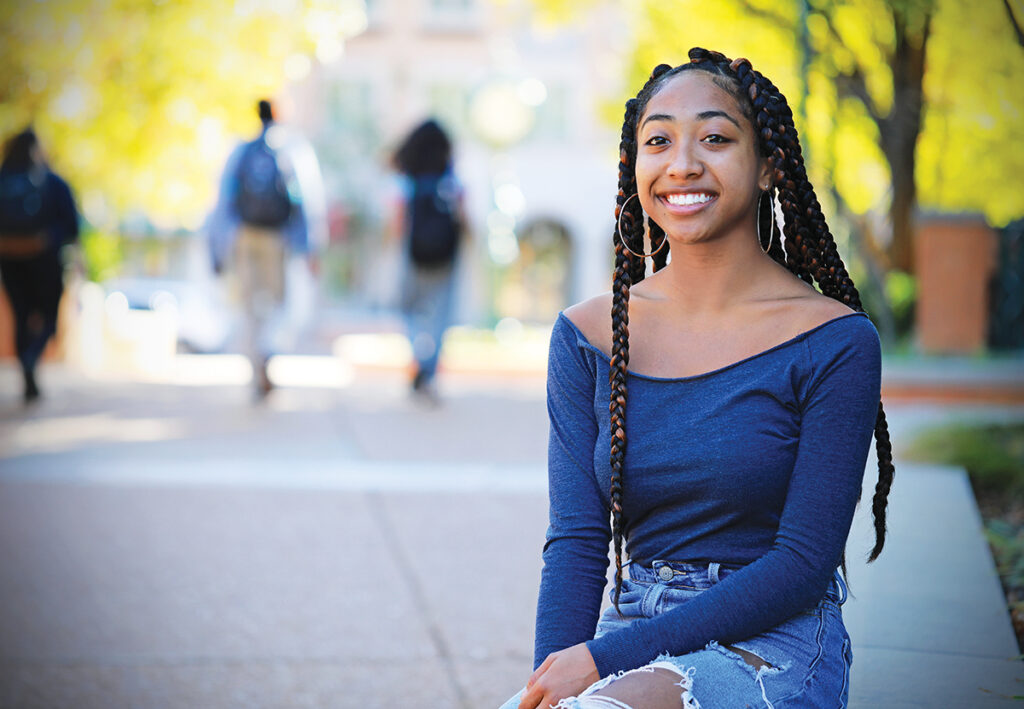
Photo by James Byard
First-year student Ella Holman has lived in St. Louis her entire life. But it was not until her first year in high school that she heard of Washington University in St. Louis. That’s when she was nominated for the College Prep Program, an innovative multiyear program for talented low-income students from St. Louis–area high schools.
For three summers, Holman and her fellow scholars lived and learned on campus, earning college credit, drafting college admissions essays, mastering skills such as time management, and meeting successful college students.
“Seeing all of these black girls who were excelling at this prestigious school was so inspiring,” Holman says. “I wanted to be just like them, and now I have the chance.”
Holman already had decided to apply to Washington University when the university established the College Prep Scholarship for admitted graduates of the program. Ten other members of her cohort also are attending Washington University through the scholarship.
“We couldn’t believe it when we found out about the scholarship,” Holman says. “It made my dream school a reality. I was confident that I could make my way at any school, but this was the place that felt like home.”
Since arriving, Holman has joined the cheerleading squad,
WashU Dance Collective and WashU Dance Theatre. She also is a member of Deneb STARS, a cohort program that connects low-income, first-generation students to resources and mentors. Named for the farthest star that can be seen with the unaided eye, Deneb STARS attracts top students from across the country.
Holman has yet to decide her major. She may choose dance. Or African and African-American studies. Or sociology. Or mathematics.
“In high school, I was very focused on getting into college — go to class, get the As, do the extracurricular activities,” Holman says. “Now that I’m in college, I get to ask myself, ‘What’s next? What do you want to do? What do you like?’”
Holman is certain about one thing: She will use her education to better St. Louis.
“There is a world beyond St. Louis that I want to explore,” Holman says. “But at my core, I care about my family and my home. And St. Louis, in its entirety, is my home.”

Photo by James Byard
Gabriela Hall remembers the moment she found out she would become a Rodriguez Scholar and attend WashU.
“I was eating lunch with my friends in this big noisy cafeteria, and my mom called. She was mad that I hadn’t been answering my phone,” Hall says. Her mother had been asked not to share the good news. She just told her daughter to call a certain number, right now. It was a former Rodriguez Scholar telling Hall that she had been selected.
“I was standing outside the lunch room, so excited,” Hall recalls. “I wouldn’t have been able to attend Washington University without Rodriguez.”
With the Rodriguez Scholarship, Hall found a supportive group of compatriots. They all quickly bonded at a three-day pre-orientation retreat. “The people that I’ve met and the experiences that I’ve had are priceless,” Hall says. “The Rodriguez community has made [attending WashU] very fun.”
Hall had long been interested in engineering and public policy, and she was glad she’d have opportunities to study across disciplines at WashU. Today, she studies systems engineering and takes electives in policy.
From the start, Hall has thrown herself into college life. She conducts research in the micro/nano photonics lab; is chair of the Lego Robotics program; and volunteers with Niños Cambios Puertas, a college mentoring program. She also receives intensive leadership training through the Civic Scholars Program.
“It’s been challenging,” Hall says. “But I’ve learned so much about myself here.”
This past summer, Hall won a Newman Travel Fund grant that allowed her to conduct research at RWTH Aachen University in Germany. Being there inspired Hall’s future plans.
“In Germany, people trust the scientific community more than in the United States,” Hall says. “I want to bridge the divide between the policy-making process and the scientific community here in the U.S. And while doing so, I hope to bridge the divide between the scientific community and the public.”
Hall isn’t certain yet what that looks like. But she feels confident and supported going forward. “I’ve met so many wonderful people here that I can be myself with. I didn’t feel that before coming here,” she says. “And that is so important.”
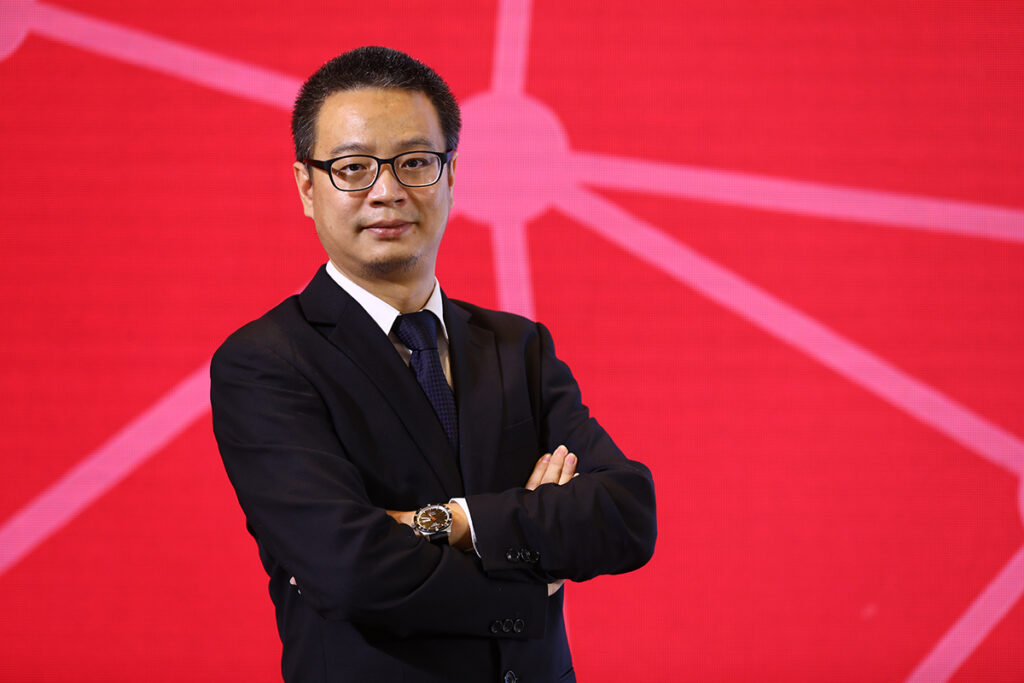
Li Chen’s passion for the law has taken him around the world.
“I have an unwavering belief in the power of law as an effective, useful instrument to seek social change,” Chen says. “To effectively tackle intractable challenges at home in China, I felt that I ought to gain exposure to a variety of legal systems and legal education in the Anglo-American world as well as continental Europe.”
Chen had already studied at the Chinese University of Hong Kong, the National University of Singapore and New York University Law School before discovering the McDonnell International Scholars Academy at Washington University.
At the time, Chen was applying to several institutions, but he says, “WashU offered some unique advantages that I just couldn’t pass it up.” Advantages included mentorship and innovative leadership training.
Chen earned his LLM as a McDonnell International Scholars Academy and Lee Foundation Fellow in 2012. He then went to Oxford and Harvard before returning to WashU and the academy to enroll in the joint Juris Scientiae Doctoris (JSD) and Juris Doctoris (JD) program in the law school. Despite his worldwide education, Chen says that his experience at WashU stands out.
“The academy sent us to Washington, D.C., and New York City to meet with leaders in business, politics, journalism and education,” he recalls. “Engaging in in-depth conversations with some of these luminaries was priceless.”
After earning his degrees, Chen worked briefly as a visiting assistant professor in WashU’s law school. Then in 2017, he returned to China to work as an associate professorial fellow at Fudan University. He credits WashU with preparing him for his current success.
“My experience with WashU and the academy prepared me well for leading initiatives advocating for the internationalization of legal education in my home country,” he says. “My JSD and JD training exposed me to the Socratic method of teaching. I now try my best to emulate my U.S. professors’ way of teaching in delivering my classes here at Fudan, encouraging my students to be critical, creative and open-minded.”
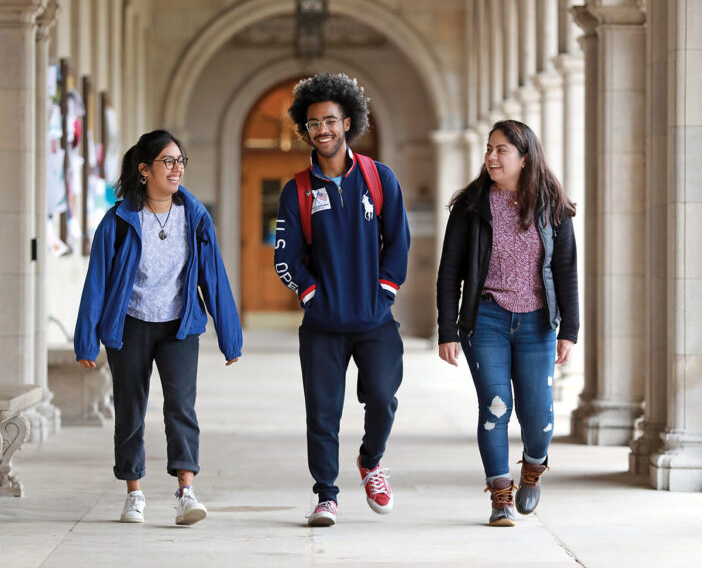
–Mark S. Wrighton
Undergraduates (from left) Jazmin Garcia, Rob Hall and Carol Pazos are McLeod Scholars. The McLeod Scholars program honors the late James E. McLeod, a former vice chancellor for students and dean of the College of Arts & Sciences. Photo by James Byard /Washington University

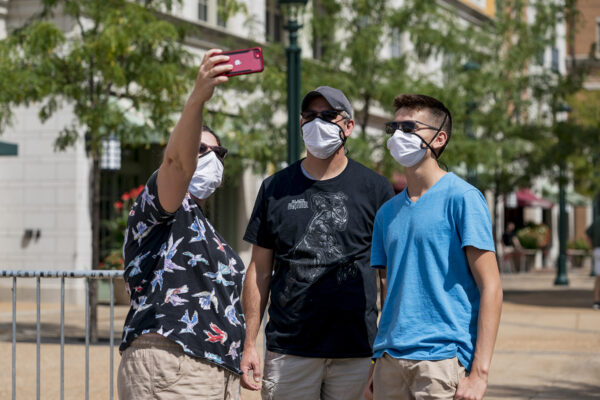
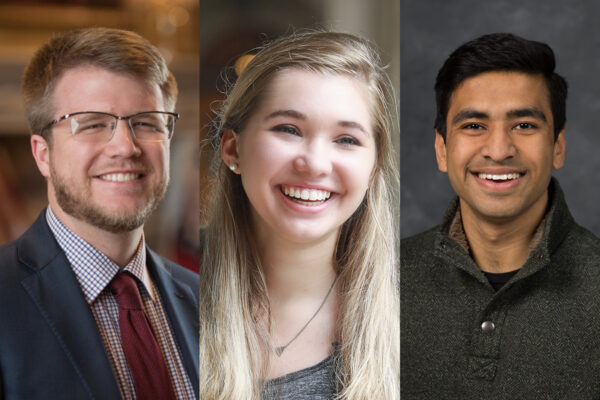
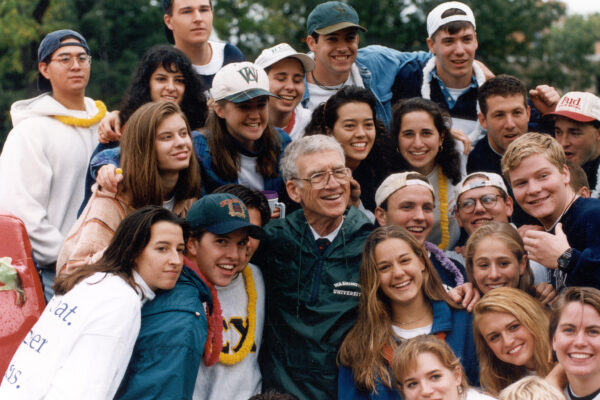
Comments and respectful dialogue are encouraged, but content will be moderated. Please, no personal attacks, obscenity or profanity, selling of commercial products, or endorsements of political candidates or positions. We reserve the right to remove any inappropriate comments. We also cannot address individual medical concerns or provide medical advice in this forum.